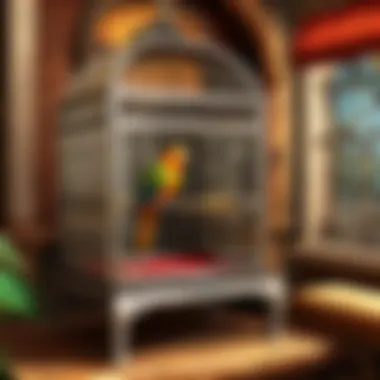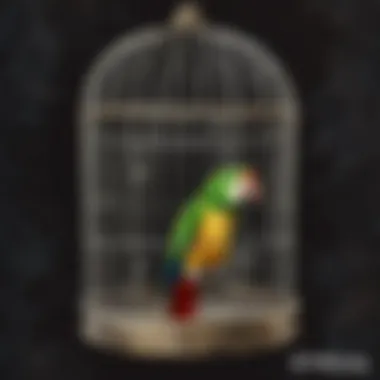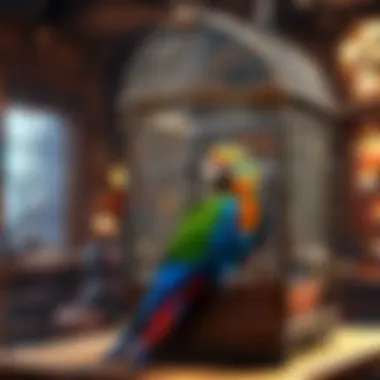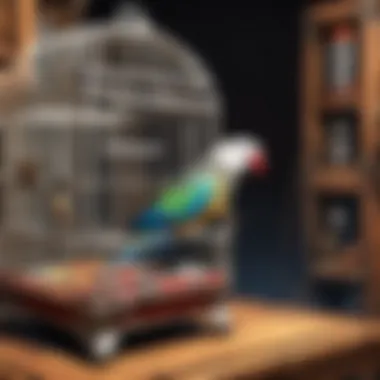Ultimate Buying Guide for Choosing the Perfect Parrot Cage


Game Updates and Patch Notes
Parrot cages require meticulous attention to detail when it comes to selecting the ideal housing for our colorful avian companions. These updates and notes serve as valuable insights into optimizing the comfort and safety of your feathered friend.
Size is a critical aspect to consider, ensuring that the cage provides ample space for your parrot to move around freely and exercise its wings. Poorly sized cages can lead to stress and discomfort for your pet, impacting their overall well-being.
Material selection plays a vital role in the durability and safety of the cage. Opting for non-toxic materials is essential to prevent any harm to your parrot in case of chewing or exploration. Stainless steel and wrought iron are popular choices due to their sturdiness and longevity.
Features such as secure locks, removable trays for easy cleaning, and perches for resting are integral components to enhance the functionality and convenience of the cage. Prioritizing these features ensures both you and your parrot a hassle-free experience.
Maintenance of the parrot cage is vital for the health of your feathered companion. Regular cleaning, disinfecting, and checking for any wear and tear are routine tasks that must not be overlooked. Neglecting maintenance could lead to health issues for your parrot.
Introduction
In this comprehensive guide to purchasing parrot cages, it is essential to understand the significance of selecting the right enclosure for your feathered companion. A parrot's cage serves as its primary living space, influencing its overall well-being and quality of life. Ensuring the comfort, safety, and mental stimulation of your parrot starts with the choice of an appropriate cage.
Parrot owners must recognize that each bird species has unique requirements when it comes to housing. The right cage can provide a sense of security, adequate space for movement, and a stimulating environment that promotes physical activity and mental engagement.
Without a suitable cage, parrots may experience stress, anxiety, and even health issues. A poorly chosen cage can limit their mobility, lead to boredom, and create safety hazards. Therefore, investing time and effort into selecting the ideal cage is crucial for the long-term well-being of your avian companion.
Factors such as size, material, and design play significant roles in the suitability of a cage for your parrot. Understanding these elements and their implications is key to making an informed decision that caters to your bird's specific needs. By considering these factors thoughtfully, you can create a comfortable and enriching living space for your feathered friend.
Why Choosing the Right Cage Matters
Ensuring that you select the most suitable cage for your avian companion is not merely a matter of aesthetics; it plays a pivotal role in their well-being and quality of life. The significance of this decision encompasses various vital aspects that directly impact your parrot's physical and psychological health. The dimensions, materials, and design of the cage all influence your bird's behavior and overall satisfaction. Opting for an inadequate cage can lead to stress, boredom, and even physical harm for your feathered friend. Thus, the choice of the right cage transcends mere functionality; it is a statement of your commitment to providing a nurturing environment that fosters happiness and contentment for your beloved pet.


Size stands out as a primary concern when considering a parrot cage, as it dictates your bird's freedom of movement and overall comfort. A cramped cage can induce feelings of confinement and stress, leading to behavioral issues and health problems. In contrast, a spacious enclosure allows your parrot to exercise, play, and explore, promoting physical and mental stimulation essential for their well-being. Additionally, the size of the cage correlates with the bird's wingspan, ensuring they can extend their wings fully without restriction, which is imperative for their natural instincts and physical health.
Alongside size, the material of the cage holds significant importance in determining its durability and safety for your parrot. Different materials offer varying levels of strength, resistance to rust, and ease of cleaning. Stainless steel, wrought iron, and powder-coated metal are popular choices known for their sturdiness and longevity. These materials not only provide a secure environment for your parrot but also withstand the wear and tear of daily use, ensuring a long-lasting investment in your pet's well-being.
Bar spacing is another critical factor that often goes unnoticed but can have dire consequences if overlooked. The spacing between bars should be narrow enough to prevent your parrot from escaping or getting stuck while also promoting adequate airflow within the cage. Bars that are too widely spaced pose a significant hazard to your bird's safety, increasing the risk of injury or escape. Therefore, selecting a cage with appropriate bar spacing is paramount to safeguarding your parrot and ensuring a secure living space for them.
Accessibility plays a crucial role in the convenience of cleaning and maintenance tasks associated with the cage. Easy access to food and water dishes, perches, and toys simplifies daily care routines, promoting hygiene and well-being for your parrot. A cage with multiple access points and removable components facilitates cleaning, feeding, and interacting with your bird, fostering a harmonious relationship based on trust and comfort. Prioritizing accessibility in your cage selection process enhances the overall experience for both you and your feathered companion, making daily interactions more enjoyable and stress-free.
Lastly, the cleaning and maintenance requirements of the cage should not be underestimated, as they directly impact the health and hygiene of your parrot's living environment. Choose a cage that allows for easy cleaning, with removable trays, grates, and bottom pans that streamline the removal of waste and debris. Regular maintenance tasks, such as changing bedding, cleaning dishes, and sanitizing perches, are essential to prevent the buildup of bacteria and odors that can compromise your bird's health. By selecting a cage designed for practical maintenance, you ensure that your parrot enjoys a clean and healthy habitat that supports their well-being and vitality.
In essence, the considerations outlined in this section emphasize the profound impact that the choice of a parrot cage can have on your feathered friend's life. By understanding the intricate relationship between cage quality and your bird's happiness, you empower yourself to make informed decisions that prioritize their welfare and fulfillment. Choosing the right cage transcends mere functionality; it is a testament to your commitment as a responsible pet owner dedicated to providing the best possible care for your beloved parrot.
Factors to Consider
When it comes to choosing the perfect parrot cage, several crucial factors must be taken into consideration to ensure the overall well-being and comfort of your feathered companion. The size of the cage, the material it's made of, the spacing between bars, accessibility features, and cleaning and maintenance requirements all play essential roles in providing a safe and stimulating environment for your parrot. Each of these factors contributes significantly to your bird's physical health, mental well-being, and overall happiness, making them fundamental aspects to evaluate during the cage-selection process.
Size of the Cage
The size of the cage is perhaps one of the most critical considerations when purchasing a parrot enclosure. Parrots are highly active and intelligent birds that require ample space to move around freely, stretch their wings, and engage in natural behaviors such as climbing and playing. A cage that is too small can lead to stress, boredom, and even physical health issues like obesity and muscle atrophy. Therefore, opt for the largest cage that your space and budget can accommodate, ensuring that it provides enough room for your parrot to exercise, explore, and express its natural behaviors.
Material
When selecting a parrot cage, the material it is constructed from is a key factor to evaluate. Opt for cages made from non-toxic and durable materials such as stainless steel, wrought iron, or powder-coated metal. These materials are not only sturdy and long-lasting but also safe for your parrot, as they minimize the risk of toxicity from chewing or ingesting cage components. Additionally, choose a cage with a secure locking mechanism to prevent your intelligent bird from escaping and ensure its safety at all times.
Bar Spacing
Bar spacing is another crucial consideration when choosing a parrot cage. The gaps between bars should be narrow enough to prevent your parrot from squeezing its head or body through them, which can lead to injuries or escapes. However, the bars should not be so close together that they inhibit your bird's movement or visibility. Consider the size and species of your parrot when evaluating bar spacing to ensure that it meets your bird's needs while providing a secure and comfortable environment.


Accessibility
Access features such as large doors, removable trays, and feeder access points are essential for maintaining and interacting with your bird easily. Easy access to the cage interior simplifies cleaning tasks, feeding routines, and social interactions with your parrot. Choose a cage with multiple doors and a design that allows you to reach all areas of the cage comfortably without causing stress to your bird. Accessibility features enhance the overall usability of the cage, making daily care and interaction more convenient and enjoyable for both you and your feathered companion.
Cleaning and Maintenance
Proper cleaning and maintenance are vital aspects of parrot care and should not be overlooked when selecting a cage. A cage that is easy to clean and maintain ensures a hygienic environment for your bird, reducing the risk of disease and promoting its health and well-being. Look for cages with removable trays, access doors for cleaning, and straightforward assembly for periodic maintenance tasks. Regular cleaning not only keeps your parrot healthy but also prolongs the lifespan of the cage, ensuring a safe and comfortable home for your feathered friend for years to come.
Types of Parrot Cages
In the realm of parrot care, the type of cage you choose plays a pivotal role in the overall well-being and happiness of your feathered companion. Understanding the nuances of different cage types can significantly enhance your ability to provide a comfortable and engaging environment for your parrot. The various types of parrot cages available cater to differing needs, lifestyles, and species of parrots, each offering unique benefits and considerations.
Flight Cages
Flight cages are spacious enclosures designed to accommodate the natural behaviors of parrots, such as flying and movement. These cages provide ample room for your parrot to spread its wings and exercise, promoting physical health and mental well-being. Considerations when choosing a flight cage include the size, bar spacing, and overall construction to ensure that it meets the specific requirements of your parrot. Flight cages are ideal for larger parrot species that require more space to move and explore.
Playtop Cages
Playtop cages are innovative designs that combine living space with recreational elements for your parrot's enjoyment. These cages often feature top play areas with perches, ladders, and toys, encouraging mental stimulation and physical activity. When selecting a playtop cage, factors to consider include the quality of the play area, the durability of materials, and ease of cleaning. Playtop cages are suitable for parrots that thrive on interactive play and enrichment, providing a stimulating environment for their intellectual and physical needs.
Travel Cages
Travel cages are specially designed to ensure the safety and comfort of your parrot during transportation or short trips. These cages are typically lightweight, portable, and compact, making them convenient for outings or vet visits. When choosing a travel cage, consider features such as secure locks, ventilation, and ease of assembly. Travel cages are essential for pet owners who need to transport their parrots securely while maintaining their well-being. Understanding the unique characteristics of travel cages is crucial for ensuring your parrot's safety and comfort on the go.
Features to Look For
When considering a parrot cage, the features you choose can significantly impact your feathered friend's well-being and happiness. Among the crucial elements to inspect are feeders and water dishes, perches and ladders, as well as cage covers. Each of these features plays a vital role in ensuring that your parrot feels safe, comfortable, and entertained in its living space.


Feeders and Water Dishes
Feeders and water dishes are indispensable components of a parrot's cage. These items allow for easy access to food and water, catering to your parrot's nutritional needs. When selecting feeders and water dishes, prioritize those that are durable, easy to clean, and securely attach to the cage to prevent spills and mess. It's essential to choose the right size and design based on your parrot's breed and eating habits to promote a healthy feeding routine.
Perches and Ladders
Parrots are naturally inclined to climb and perch, making perches and ladders essential features in their cage. Providing a variety of perch sizes and textures can help promote foot health and prevent boredom. Ladders offer entertainment and exercise opportunities for your parrot, simulating its natural habitat. Ensure that perches are made from safe, non-toxic materials and ladders are securely installed to avoid accidents.
Cage Covers
Cage covers are not just decorative; they serve functional purposes in a parrot's environment. Covering the cage at night can help create a dark, quiet atmosphere conducive to restful sleep. Additionally, cage covers can offer your parrot privacy and security during times of stress or excitement. Opt for breathable, easy-to-clean covers that fit securely over the cage for maximum comfort and light control.
Budget Considerations
When it comes to selecting a parrot cage, considering your budget is a crucial element that should not be overlooked. The financial aspect of purchasing a parrot cage plays a significant role in the entire decision-making process. Understanding your budget constraints right from the beginning can help streamline your options and prevent you from overspending. Creating a budget ensures that you focus on cages that not only meet your parrot's needs but also fall within your financial comfort zone.
One of the primary benefits of paying attention to budget considerations is that it allows you to narrow down your choices based on what you can afford. By establishing a clear budget range, you can eliminate cages that are either too expensive or too cheap, helping you to concentrate on those that align with both your financial resources and your parrot's requirements.
Additionally, being mindful of your budget can also help you prioritize certain features or aspects of the cage that are non-negotiable for you and your parrot. For instance, if you have a specific amount set aside for the cage, you may decide to invest more in high-quality materials or larger dimensions rather than optional add-ons.
When considering budget constraints for purchasing a parrot cage, you should weigh the upfront cost of the cage against its long-term durability and functionality. Opting for a slightly pricier cage made of sturdy materials may save you money in the long run by reducing the need for frequent replacements or repairs.
Moreover, factoring in your budget allows you to explore various options that fit within your financial boundaries without compromising on the essential aspects that contribute to your parrot's well-being. Whether it's choosing between different material types, sizes, or additional features, having a defined budget empowers you to make informed decisions that benefit both your parrot and your wallet. By integrating budget considerations into your buying journey, you can strike a balance between affordability and quality, ensuring a harmonious living environment for your feathered companion.
Conclusion
When it comes to selecting the right parrot cage for your feathered companion, the significance of making an informed decision cannot be overstated. The cage serves as the primary habitat for your parrot, influencing their overall well-being and quality of life. A well-chosen cage can provide a secure and comfortable environment, while an ill-fitting or substandard cage can lead to stress, discomfort, and potential health issues.
One of the key elements to consider in the conclusion of this buying guide is the emphasis on the parrot's safety. A proper cage ensures that your parrot is secure, preventing any escapes or injuries. Additionally, the right cage size can promote healthy behavior and movement for your parrot, allowing them to stretch their wings and engage in natural activities.
Furthermore, maintenance plays a crucial role in the longevity of the cage and the well-being of your parrot. Regular cleaning and upkeep not only extend the lifespan of the cage but also contribute to a hygienic environment for your feathered friend. It is essential to choose a cage that facilitates easy cleaning and maintenance to uphold the highest standards of cleanliness.
Considering the psychological well-being of your parrot is also vital in the cage selection process. The cage should offer ample space for your parrot to move around freely, explore different perches, and feel a sense of security within their enclosure. Enrichment features such as toys, ladders, and swings can enhance your parrot's mental stimulation and prevent boredom.



